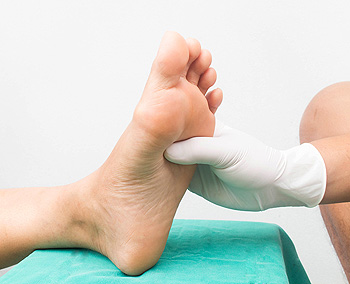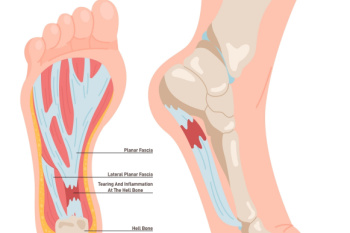
Diabetic patients face several risk factors that can impact foot health, including poor circulation and high blood sugar levels that can lead to nerve damage. Preventing nerve damage involves maintaining good blood sugar control through a balanced diet, regular exercise, and prescribed medications. Regular foot care is essential for diabetic patients to prevent complications. Daily inspections of the feet for cuts, blisters, or any signs of infection are crucial. Keeping the feet clean and moisturized helps prevent dryness and cracking. Wearing properly fitted shoes reduces the risk of pressure sores and injuries. Additionally, regular check-ups with a podiatrist ensures early detection and treatment of any foot issues. If you have diabetes, it is strongly suggested that you are under the care of this foot doctor who can help you to manage this condition.
Diabetic foot care is important in preventing foot ailments such as ulcers. If you are suffering from diabetes or have any other concerns about your feet, contact one of our podiatrists from InStride Family Foot Care. Our doctors can provide the care you need to keep you pain-free and on your feet.
Diabetic Foot Care
Diabetes affects millions of people every year. The condition can damage blood vessels in many parts of the body, especially the feet. Because of this, taking care of your feet is essential if you have diabetes, and having a podiatrist help monitor your foot health is highly recommended.
The Importance of Caring for Your Feet
- Routinely inspect your feet for bruises or sores.
- Wear socks that fit your feet comfortably.
- Wear comfortable shoes that provide adequate support.
Patients with diabetes should have their doctor monitor their blood levels, as blood sugar levels play such a huge role in diabetic care. Monitoring these levels on a regular basis is highly advised.
It is always best to inform your healthcare professional of any concerns you may have regarding your feet, especially for diabetic patients. Early treatment and routine foot examinations are keys to maintaining proper health, especially because severe complications can arise if proper treatment is not applied.
If you have any questions please feel free to contact our offices located in Concord, Charlotte, and Salisbury, NC . We offer the newest diagnostic and treatment technologies for all your foot and ankle needs.
 Plantar fasciitis
Plantar fasciitis

 Rheumatoid arthritis
Rheumatoid arthritis